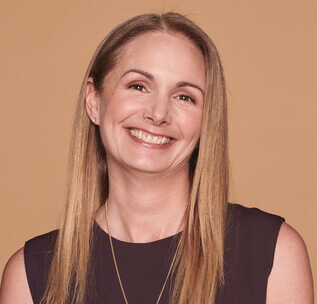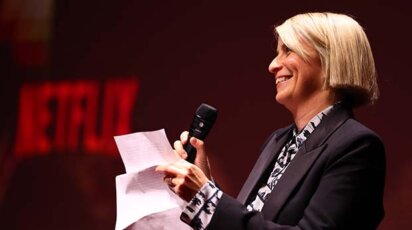News
Alumna Experience with “COVID Hotel” Sheds Light on Health Care Inequities

Kathleen Martin Stillo ’88 witnessed firsthand how the COVID-19 pandemic affected people who often fall through the cracks in our health care system. In March, as Chief Operating Officer of the Clinical Redesign team at UnitedHealthcare, she got a call from leaders at the New Jersey Department of Health asking for a leadership team to go to Secaucus “right away” to convert a hotel into a recovery center for COVID patients. The recovery center would be set up alongside the field hospitals run by FEMA and the National Guard.
As the crisis exploded, northern New Jersey hospitals were turning patients away. “We had to decompress the hospitals due to the crush of COVID patients coming in,” Stillo explained. “I said ‘yes,’ and suggested that they recruit my co-worker Dr. Jeffrey Brenner, as chief medical officer. He and I have led clinical programs together for many years. Our boss, the CEO of the Medicaid line of business at UnitedHealthcare, was immediately supportive, and she loaned us to the NJ Department of Health for this deployment.”
They left the next day for Secaucus, where a 168-room Courtyard by Marriott was turned over to them for use as a COVID care center for health care workers, patients discharged from the hospital, the homeless, and health care providers who had been exposed to the virus. “I served as chief operating officer of the alternate care site, affectionately called the “COVID hotel,” Stillo said. She ran “all business operations including overall strategy, clinical and nonclinical staffing, patient safety and experience, and development of standard operating procedures.”
“You treated me like a person.”

Stillo said they built a team of more than 40 people to provide around the clock care within a few days, implemented protocols, built IT systems, and learned how to keep their team safe. “Patients who came to the recovery center were debilitated, weak, on oxygen, and had lost track of their families,” she said. “Patients showed up without shoes or clothes. Many didn’t speak English. They were frightened and confused by their experience through the health care system. The team helped patients rehabilitate, reconnect with family, and find shelter if they were homeless.” Stillo is especially proud that no staff member came down with the virus and all of their patients recovered. When one patient was leaving the COVID hotel, he said to Stillo, “You treated me like a person.” Stillo’s team was aware they were taking care of people who had no one else to take care of them.
She said this was like a “call to arms” to fix our broken health care system that does not work for many. There has to be a better care model and Stillo is dedicated to creating that. She believes we can deliver outstanding primary care while still having a profitable business.
This health care innovation seed was planted early in her life. “As an undergrad at Bowdoin,” Stillo said, “I studied abroad in South India. My host family ran the Aravind Eye Hospital, a world-renowned health care innovator which eliminates needless blindness by performing cataract surgery for thousands of people who cannot afford to pay, and restoring their sight. My major was religion, but what I learned at the dinner table every night from my host family is that health care can be delivered so efficiently and effectively that all socio-economic classes of patients will come, and the higher paying service differentiators can support the entire business.”
“I became a lifelong learner and my time at Poly sharpened my desire to do meaningful work.”
Stillo says Poly Prep was an important part of her personal and professional development. “I became a lifelong learner and my time at Poly sharpened my desire to do meaningful work,” she said. Stillo recalls her most empathetic and inspiring Poly teachers, Latin teacher Gil “Feldy” Feldman ’42, and biology teacher Sandra Stone, who taught her to establish a “lifelong love of learning.”
After graduating, Stillo went on to lead a small internal consulting team at Bristol-Myers Squibb focused on improving drug development timelines. “They sponsored me for my MBA at Columbia Business School,” Stillo said. “The Aravind Eye Hospital was a featured case study in my Operations class…. and I was reminded that leading the business side of clinical care was what I most wanted to do. I moved into hospital administration in Camden, NJ after graduating, and co-founded the Urban Health Institute at the safety net hospital, Cooper, dedicated to outpatient care for the most sick and vulnerable patients in Camden.”
While leading her team in Camden, Still brought 18 staff to Aravind in India to study their model of protibale, frugal and efficient health care. She said of the experience: “It felt like my life coming full circle—my team was learning how to care for those who are most vulnerable from my Indian host family.”
After seeing results in Camden including a 58% reduction in the deficit of the Medicaid service line, establishing a superutilizer clinic, and building an addiction medicine group, she took the COO role at UnitedHealthcare to scale and replicate innovative programs for Medicaid patients across the country. “I co-led the Clinical Redesign team at United, which focused on addressing social determinants of health beyond just what happens in an exam room between a provider and a patient,” Stillo said. This included a program called Housing + Health, because “housing the homeless, who are superutilizers of the health care system,” is actually health care. And that investment can generate a material business return,” she said.
“COVID presents a unique opportunity to redesign primary care to drive down unit costs and improve outcomes using standardization, protocolization, telehealth, and consolidation of backend clinical services,” said Stillo, all components of the care teams she has led over the past 10 years.
“COVID has reset everyone’s thinking about health care.”
After closing the COVID hotel, Stillo left UnitedHealthcare in July and is launching a new health care venture with her longtime clinical partner, Dr. Jeffrey Brenner. Juna Care will be a “full-service, holistic family medicine office providing in-person, telehealth, and home-based care to children and adults of all ages,” said Stillo. “Our approach is trauma-informed, and our services include options such as group visits, health coaching, and medication assisted treatment for addictions.” The site will be located in a lower middle class neighborhood southwest of Philadelphia.
“COVID has reset everyone’s thinking about health care,” Stillo said. “Going back to exclusively in-person patient visits would not allow us to harvest what we learned in a crisis.” Stillo sees the benefits of a highly adaptive model of health care and is excited to build a new kind of health care delivery service.



